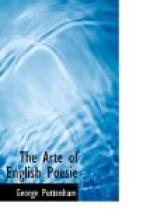dauncer, singer, & player on instruments, because they
be not exactly knowne or done, but by rules & precepts
or teaching of schoolemasters. But in such actions
as be so naturall & proper to man, as he may become
excellent therein without any arte or imitation at
all, (custome and exercise excepted, which are requisite
to euery action not numbred among the vitall or animal)
and wherein nature should seeme to do amisse, and
man suffer reproch to be found destitute of them:
in those to shew himselfe rather artificiall then
naturall, were no lesse to be laughed at, then for
one that can see well inough, to vse a paire of spectacles,
or not to heare but by a trunke put to his eare, nor
feele without a paire of ennealed glooues, which things
in deed helpe an infirme sence, but annoy the perfit,
and therefore shewing a disabilitie naturall mooue
rather to scorne then commendation, and to pitie sooner
then to prayse. But what else is language and
vtterance, and discourse & persuasion, and argument
in man, then the vertues of a well constitute body
and minde, little lesse naturall then his very sensuall
actions, sauing that the one is perfited by nature
at once, the other not without exercise & iteration?
Peraduenture also it wil be granted, that a man sees
better and discernes more brimly his collours, and
heares and feeles more exactly by vse and often hearing
and feeling and seing, & though it be better to see
with spectacles then not to see at all, yet is their
praise not egall nor in any mans iudgement comparable:
no more is that which a Poet makes by arte and precepts
rather then by naturall instinct: and that which
he doth by long meditation rather then by a suddaine
inspiration, or with great pleasure and facillitie
then hardly (and as they are woont to say) in spite
of Nature or Minerua, then which nothing can be more
irksome or ridiculous.
And yet I am not ignorant that there be artes and
methods both to speake and to perswade and also to
dispute, and by which the naturall is in some sorte
relieued, as th’eye by his spectacle, I say relieued
in his imperfection, but not made more perfit then
the naturall, in which respect I call those artes
of Grammer, Logicke, and Rhetorick not
bare imitations, as the painter or keruers craft and
worke in a forraine subiect viz. a liuely purtraite
in his table of wood, but by long and studious obseruation
rather a repetition or reminiscens naturall, reduced
into perfection, and made prompt by use and exercise.
And so whatsoeuer a man speakes or perswades he doth
it not by imitation artificially, but by obseruation
naturally (though one follow another) because it is
both the same and the like that nature doth suggest:
but if a popingay speake, she doth it by imitation
of mans voyce artificially and not naturally being
the like, but not the same that nature doth suggest
to man. But now because our maker or Poet is
to play many parts and not one alone, as first to
deuise his plat or subiect, then to fashion his poeme,




